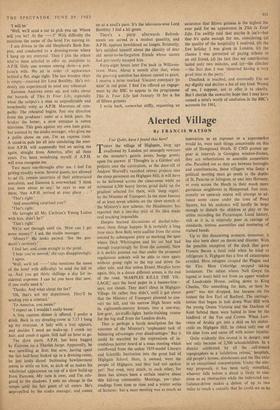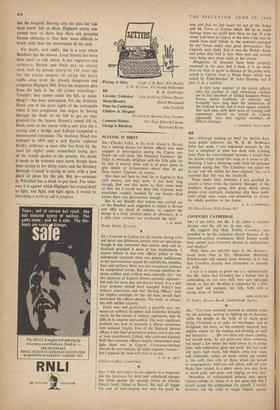Implacable Conscience
Conversations with Stalin. By Milovan Djilas. (Rupert Hart-Davis, 16s.) IT is a pity that this book cannot be reviewed by Mr. Vladimir Dedijer, now in this country. For though the observation is much sharper, and many minor details are added, on the face of it Djilas's account of the political troubles between Yugoslavia and the Soviet Union differs little from that given in Dedijer's semi-official Tito Speaks, published here in 1953.
Yet one's impression that one has read all Djilas says before is a superficial one. He uses the same framework of facts. But his emphasis is elsewhere—on the nature of Stalin himself and of the system which sprang up round him. The lessons he draws from his experience of Stalin and the Stalinist milieu are powerfully and effectively argued in a 'conclusion.' This is not specifically critical of the Yugoslav regime, but it is of the Khrushchev regime, and by con- demning all 'ideological conformity and so- called monolithic structure of the party,' can be taken amiss by anyone whom the cap fits, in- cluding the rulers in Belgrade.
Djilas's courage and honesty have never been in doubt. One of the most extraordinary things about the book is its very starting point—that a man like Djilas, tough-minded, highly edu- cated, brave and independent, should have in the first place found himself accepting the Stalin myth. Djilas has elsewhere argued that the fault of Marxism is the absence of a theory of politi- cal liberty (it should be added that this is not Marx's fault; he took such liberty for granted). The lesson of Djilas's whole career is that poli- tical liberty is not something which can be sacri- ficed for larger aims with any hope of genuine results. He stands as a warning to any who may fall into the same temptation. And he continues, at the cost of his own freedom, lucidly and strikingly to press the point home.
As to his recent trial, some reviewers have implied that it was Djilas's revelation that two Yugoslav divisions were about to march into Albania early in 1948 which constituted his 'betrayal of State secrets.' In fact, Dedijer has already mentioned this in the following form:
The Albanian government asked the Yugo- slav government to send two Yugoslav divisions to southern Albania, because Enver Hoxha was afraid that the Greeks might occupy some areas of Albanian territory, which, they claimed, were inhabited by Greeks.
All in all, Stalin was a monster who, while adhering to abstract, absolute, and fundamen- tally utopian ideas, in practice had no criterion but success—and this meant violence, and phy- sical and spiritual extermination.
His own view of politics is different: 'I am, of course, far from thinking that success in political struggles is the only criterion.' And he em- phasises that even the current 'cheap theatrical' de-Stalinisation shows that, in spite of tem- porary failures, 'the human conscience is
im- placable and indestructible.' In fact, back in his lonely cell in Sremska Mitrovica, he still stands in the long run for forces which have already damaged, and should in the end destroy, indi- viduals and organisations on the face of it immeasurably stronger than themselves.
ROBERT CONQUEST
First Plantagenet
Henry H. By John T. Appleby. (Bell, 35s.) HENRY H is rapidly becoming one of the better- known kings of England. For long a leading character in the familiar saga of Thomas Becket, in recent years he has won the hearts of constitutional and legal historians, and Mr. Appleby's book is a sign that the two lines of approach are meeting. Henry is here presented as 'the greatest king of the Europe of his time, and one of the greatest kings that England has ever had.' If by 'great' we mean 'powerful,' or 'influential,' or 'significant,' this judgment is cer- tainly true. Henry ruled personally and directly over wider territories than any of his mediaNal successors, and during his reign England displayed a more elaborate fiscal and judicial administra- tion than any other country, one which has de- veloped continuously without a revolutionary break down to our own time.
But it may be doubted whether Henry H was personally great in the sense that Alfred or William the Conqueror was great. He was neither a great statesman nor a great warrior, nor simply a great man. His overseas empire was artificial, and began to crumble before his death; his family life was disastrously unhappy; he quarrelled with his greatest subject and friend and was the cause of his death. His demonic energy, his tenacity in pursuing his course of self-aggrandisement, and his ability to dominate his entourage were directed to purely selfish ends. His share in making England a well-
Charge Sheet
THRILLERS, for the most part, are not a branch of literature; they are a branch of engineering. They should not be reviewed, but tested as they come off the conveyor belt. The inspector should record what type they belong to (Mark I, Mark II, Mark 111), whether the internal works are up to standard, and what kind of finish has been applied. Should he find anything on the belt that is a work of art, he will, of course, make a special note to that effect; but he will not expect to do so.
Therefore, deputising momentarily as inspec- tor of thrillers, I shall render my report as a checker would. I shall enter details under four heads: (1) Name and Origin, (2) Content, (3) Style, (4) Verdict. Here goes: (1) Bachelors Get Lonely (Heinemann, 13s. 6d.), by A. A. Fair, who is really E. S. Gardner, the creator of that bore and bully Perry Mason. (2) Donald Lam, the runt-like assistant of the vast and quarrelsome Bertha Cool, is as usual knocked about by the police, while trying to find out who stole the secrets of the Carson Investment Pool and also who peeped in on women undressing in the Sun-and- Tan Motel. (3) Chromium-plated with some anodyne sex; US standardised. (4) Will do.
(1) Doctors Also Die (Crime Club, 12s. 6d.), by D. M. Devine, a fairly new author. (2) A bullying corrupt provost, a rather ineffective young doctor who wants to marry his daughter, his partner who has died and wasn't too good a character, the widow who is too beautiful— these all stir up a muddy Scots town when murder and blackmail are suspected. (3) Pretty good style—the unpleasanter type of Scotsman and Scotswoman do talk and think like that. British standard—that is, more amateurish than American, but less dead. (4) Worth reading.

































 Previous page
Previous page